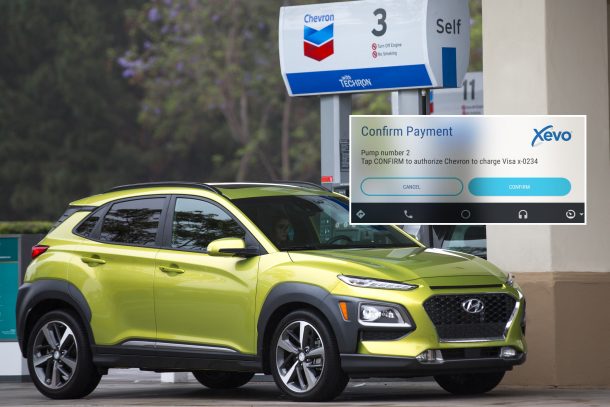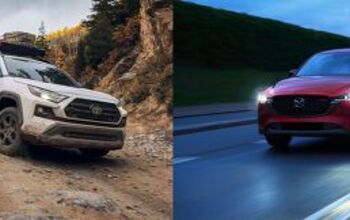The Car As a Wallet: Hyundai Adds Food, Gas, Parking for In-Car Payment Plan

Corporate partnerships and integrated purchasing solutions are all the rage right now in the auto industry. While it’s easy to miss the appeal, as credit cards are pretty easy to use when cash isn’t an option and most modern phones have similar applications, car-based transitions are on the rise. Now, Hyundai’s joining Xevo to provide its own branded in-car purchasing platform.
Like similar services, Hyundai owners will be able to sync their credit card with the vehicle and use it to locate and buy food, fuel, and parking (from participating companies). Also under development is the Hyundai Digital Wallet, “which stores a customer’s payment information and facilitates secure processing, for a seamless checkout experience to enable in-car commerce.”
Hyundai hasn’t established an official launch date — or nailed down the final design — but it insists the system is coming. Initial partners include Chevron and Texaco-branded gas stations, Applebee’s To Go and ParkWhiz. Out of the three, the parking solution seems the most useful by far. But if you absolutely refuse to get out of your seat to procure a bundle of mozzarella sticks, Hyundai (like GM) will eventually have you covered.
“We are always learning and exploring with Blue Link, having worked with technologies like Google Glass, Amazon’s Alexa, Google Assistant, Wear OS and Apple Watch,” said Cason Grover, a senior group manager at Hyundai Motor America’s vehicle technology planning division. “Usage-based insurance and in-vehicle payment can offer savings and convenience to our customers, and we look forward to offering these services.”
However, like all connected car news, there’s a dark smudge we have to address. While it wasn’t directly mentioned in this particular release, Hyundai also partnered with data firm Verisk earlier in the year. As a result, the automaker will provide the analytics company with driving data from its connected car owners. That information will then be sent to insurance companies, provided the driver consents (or neglects to opt out of the agreement).
“Our alliance with Verisk will enable new value-added services for our customers,” said Manish Mehrotra, director of digital business planning and connected operations for Hyundai Motor America. “Hyundai customers will have access to their portable “Verisk Driving Score,” which can lead to discount offers on UBI programs and support driver feedback that helps improve their driving.”
This could also lead to insurance companies trying to mandate this kind of thing in the future, penalizing motorists who don’t want their information shared (or who engage in the occasional bout of spirited driving). It’s just speculation for now, but we don’t love the precedent this sets.
It’s nothing to smile about.
[Images: Hyundai]

A staunch consumer advocate tracking industry trends and regulation. Before joining TTAC, Matt spent a decade working for marketing and research firms based in NYC. Clients included several of the world’s largest automakers, global tire brands, and aftermarket part suppliers. Dissatisfied with the corporate world and resentful of having to wear suits everyday, he pivoted to writing about cars. Since then, that man has become an ardent supporter of the right-to-repair movement, been interviewed on the auto industry by national radio broadcasts, driven more rental cars than anyone ever should, participated in amateur rallying events, and received the requisite minimum training as sanctioned by the SCCA. Handy with a wrench, Matt grew up surrounded by Detroit auto workers and managed to get a pizza delivery job before he was legally eligible. He later found himself driving box trucks through Manhattan, guaranteeing future sympathy for actual truckers. He continues to conduct research pertaining to the automotive sector as an independent contractor and has since moved back to his native Michigan, closer to where the cars are born. A contrarian, Matt claims to prefer understeer — stating that front and all-wheel drive vehicles cater best to his driving style.
More by Matt Posky
Latest Car Reviews
Read moreLatest Product Reviews
Read moreRecent Comments
- Dartdude Having the queen of nothing as the head of Dodge is a recipe for disaster. She hasn't done anything with Chrysler for 4 years, May as well fold up Chrysler and Dodge.
- Pau65792686 I think there is a need for more sedans. Some people would rather drive a car over SUV’s or CUV’s. If Honda and Toyota can do it why not American brands. We need more affordable sedans.
- Tassos Obsolete relic is NOT a used car.It might have attracted some buyers in ITS DAY, 1985, 40 years ago, but NOT today, unless you are a damned fool.
- Stan Reither Jr. Part throttle efficiency was mentioned earlier in a postThis type of reciprocating engine opens the door to achieve(slightly) variable stroke which would provide variable mechanical compression ratio adjustments for high vacuum (light load) or boost(power) conditions IMO
- Joe65688619 Keep in mind some of these suppliers are not just supplying parts, but assembled components (easy example is transmissions). But there are far more, and the more they are electronically connected and integrated with rest of the platform the more complex to design, engineer, and manufacture. Most contract manufacturers don't make a lot of money in the design and engineering space because their customers to that. Commodity components can be sourced anywhere, but there are only a handful of contract manufacturers (usually diversified companies that build all kinds of stuff for other brands) can engineer and build the more complex components, especially with electronics. Every single new car I've purchased in the last few years has had some sort of electronic component issue: Infinti (battery drain caused by software bug and poorly grounded wires), Acura (radio hiss, pops, burps, dash and infotainment screens occasionally throw errors and the ignition must be killed to reboot them, voice nav, whether using the car's system or CarPlay can't seem to make up its mind as to which speakers to use and how loud, even using the same app on the same trip - I almost jumped in my seat once), GMC drivetrain EMF causing a whine in the speakers that even when "off" that phased with engine RPM), Nissan (didn't have issues until 120K miles, but occassionally blew fuses for interior components - likely not a manufacturing defect other than a short developed somewhere, but on a high-mileage car that was mechanically sound was too expensive to fix (a lot of trial and error and tracing connections = labor costs). What I suspect will happen is that only the largest commodity suppliers that can really leverage their supply chain will remain, and for the more complex components (think bumper assemblies or the electronics for them supporting all kinds of sensors) will likley consolidate to a handful of manufacturers who may eventually specialize in what they produce. This is part of the reason why seemingly minor crashes cost so much - an auto brand does nst have the parts on hand to replace an integrated sensor , nor the expertice as they never built them, but bought them). And their suppliers, in attempt to cut costs, build them in way that is cheap to manufacture (not necessarily poorly bulit) but difficult to replace without swapping entire assemblies or units).I've love to see an article on repair costs and how those are impacting insurance rates. You almost need gap insurance now because of how quickly cars depreciate yet remain expensive to fix (orders more to originally build, in some cases). No way I would buy a CyberTruck - don't want one, but if I did, this would stop me. And it's not just EVs.




































Comments
Join the conversation
“Jane! Stop this crazy thing, Jane!” - George Jetson
Guess it may appeal to the post millennial generation (convenience; can't be bothered to pull out a CC), but something like this has the potential to create a lot more problems.